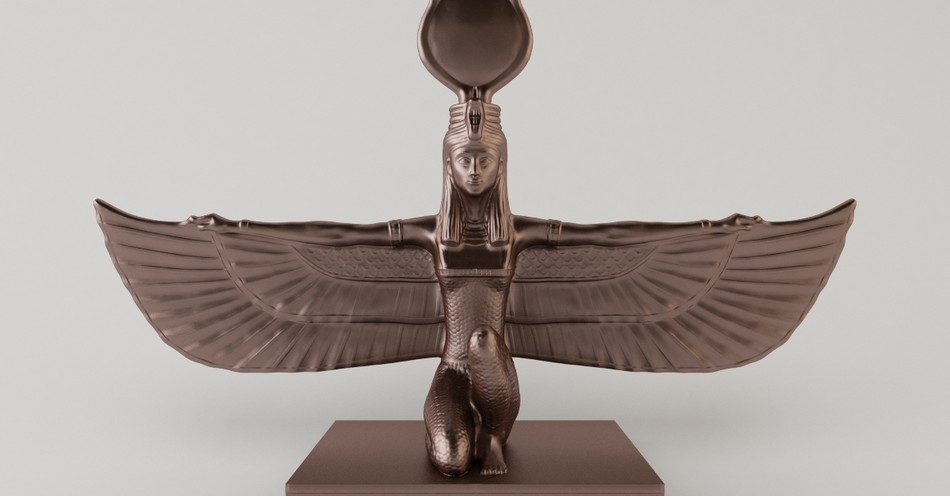Healthy choices: the choices we are supposed to make to help parts of our lives run smoothly. As human beings, we often know what a healthy choice would be; but we do not always make this choice. For example, we all know we need to eat right to fuel a healthy physical life, but who has never chosen to run through a drive-thru for a greasy burger instead of going home to cook a healthy meal? Similarly, for a healthy spiritual life, we need to be fueled by the right relationship with the one true God, our Creator.
No one knew what healthy spiritual choices looked like better than the Old Testament Israelites. They had seen time and time again what a relationship with the one true God could do. It had saved them from Egypt, led them through the wilderness, and helped them reenter their promised land. Yet, instead of worshipping the one true God as He commanded, the Israelites kept picking up false gods from neighboring cultures.
Ashtoreth is one of the main false gods mentioned in the Old Testament. Different groups have different thoughts on who Ashtoreth was and what she was associated with. Still, most modern consensus agrees that Ashtoreth’s name in scripture is a corruption of the name Astarte and that she was one of the chief female deities found in the region of Canaan.
Where Does the Bible Mention Ashtoreth?
A false goddess in the Old Testament, Ashtoreth was one of the many gods Israel turned to instead of YAHWEH.
Ashtoreth is mentioned several times throughout Judges, 1 and 2 Samuel, and 1 and 2 Kings. Her worship was a direct violation of the first of the Ten Commandments God gave to the Israelites after he saved them from Egypt:
You shall have no other gods before me. You shall not make for yourself an image in the form of anything in heaven above or on the earth beneath or in the waters below. You shall not bow down to them or worship them; for I, the Lord your God, am a jealous God, punishing the children for the sin of the parents to the third and fourth generation of those who hate me, but showing love to a thousand generations of those who love me and keep my commandments. (Exodus 20:3-6)
Though these verses do not mention Ashtoreth in particular, they provide important context for Israelite interactions with Ashtoreth and other false gods.
Judges is the first place where Ashtoreth’s name is specifically mentioned, telling us little except that she was a popular false goddess. Judges mentions Ashtoreth’s name twice in two nearly identical verses (Judges 2:13; Judges 3:7). In both verses, Israel has turned away from worshipping God and instead began worshipping “the Baals and Ashteroth.” In these verses, Ashtoreth’s name refers to any and all female deities Israel turned to. From this, we can surmise that the worship of Ashtoreth herself was so common that she had become synonymous with all false god worship, similar to how the modern shopper refers to all bandages by the well-known brand name Band-Aid. The book of 1 Samuel continues to use Ashtoreth’s name in this manner.
We learn more about Ashtoreth in 1 and 2 Kings. In 1 King 11, King Solomon opens a temple for her in Jerusalem to appease one of his many foreign wives. Here is where we first learn that Ashtoreth was specifically related to the Phoenician city of Sidon.
Ashtoreth’s worship, along with that of the goddess Asherah, was spread even more during the reign of King Ahab. His wife Jezebel was a Phoenician princess. As queen, Jezebel brought in dozens of false priests with her to Israel. The prophet Elijah faces off with these priests.
Many modern Hebrew scholars believe that Ashtoreth’s name shows God’s contempt for Israel’s dalliances with false gods, as the Bible is the only place that refers to this goddess Ashtoreth. Ashtoreth’s name seems to combine the goddess’s real name Astarte with the Hebrew word for shame, boshet.
Ashtoreth may be mentioned in other areas throughout scripture. However, it can be difficult to figure out what verses specifically refer to her for two reasons. Firstly, it can be difficult to differentiate Ashtoreth from the goddess Asherah (especially since many believe both goddesses were worshipped in tree groves known as Asherah). Secondly, many verses do not mention Ashtoreth by name. Many biblical scholars have connected Ashtoreth with the worship of the moon mentioned in 2 Kings 23:5 and with the Queen of Heaven mentioned in Jeremiah 7:18.
What Country Worshiped Ashtoreth?
As mentioned above, Ashtoreth is connected to Phoenicia, especially its city of Sidon. However, her reach throughout the ancient world went much further than the borders of Phoenicia. Many of Phoenicia’s most populous cities were famous seaports. Along with trading goods throughout the ancient world, Phoenicia also spread its culture.
As such, Ashtoreth’s cult spread throughout Canaan, Egypt, and Ugarit. In 1 Samuel, we see that the Philistines also worshipped her. Over time, her cult evolved, and her worship often intermingled with that of other deities. Parts of Ashtoreth’s cult influenced the worship of the Mesopotamian goddess Ishtar; the Egyptian goddesses Isis and Hathor; and the Greco-Roman deities of Aphrodite, Juno, and Artemis.
In the form of the Ephesian Artemis, Ashtoreth continued to impact scripture in the New Testament. In Acts 19, Paul faced off against her believers and barely escaped with his life.
What Did Ashtoreth Worshippers Do?
Ashtoreth was worshipped as the goddess of a wide variety of things. She was connected with both the moon and the planet Venus. Easton’s Bible Dictionary says she represented “the passive principle in nature.” She was also seen as a goddess of fertility, sexual love, and war. She was also known as the Queen of Heaven.
Her worshippers raised Asherah poles in her name. They also engaged in what Smith’s Bible Dictionary refers to as “the most impure rites.” This may have included sacrifices, cutting, and sexual acts. Jeremiah 44 says that Canaanites burned offerings and poured out libations to her.
Why Should We Know about Ashtoreth Today?
It isn’t difficult to understand why the Israelites continuously turned away from the one true God to false gods like Ashtoreth. The one true God never promises a perfect life, but we humans long for one. We also long to be free to act as we wish. Even though God showed the Israelites many wonders, He also created an intricate law code for them to follow. In contrast, those around the Israelites got to live as they pleased, worshipping gods who promised fertility and protection if you worshipped them in just the right way. Even though the worship of Ashtoreth included acts that would make many of us blush, there was an allure to her promises and popularity.
Though Christians today may not run after literal gods, we often chase things with that same worshipful ferocity. We see others chasing these things, and we think, “God doesn’t promise an easy life, but wealth/fame/pleasure/love/etcetera might!” We make things our gods and ignore the one we are meant to follow wholeheartedly. Matthew 6:24 tells us that we can’t serve God to our fullest if we worship something else, just as the Israelites could not please God while following Ashtoreth. Whenever you read of Israel’s idolatry, consider where idolatry is in your own life.
Photo Credit: ©Getty Images/giko
This article is part of our People of Christianity catalog that features the stories, meaning, and significance of well-known people from the Bible and history. Here are some of the most popular articles for knowing important figures in Christianity:
How Did the Apostle Paul Die?
Who are the Nicolaitans in Revelation?
Who Was Deborah in the Bible?
Who Was Moses in the Bible?
King Solomon's Story in the Bible
Who Was Lot's Wife in the Bible?
Who Was Jezebel in the Bible?
Who Was the Prodigal Son?





.jpg)